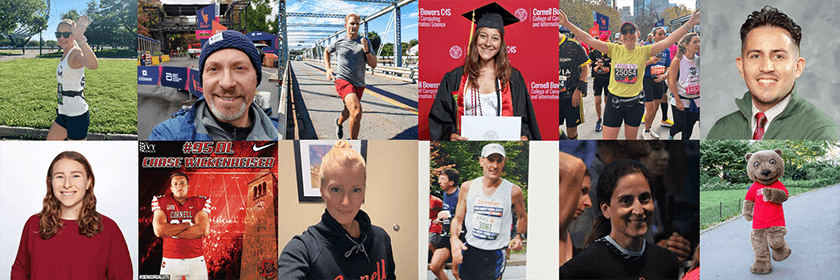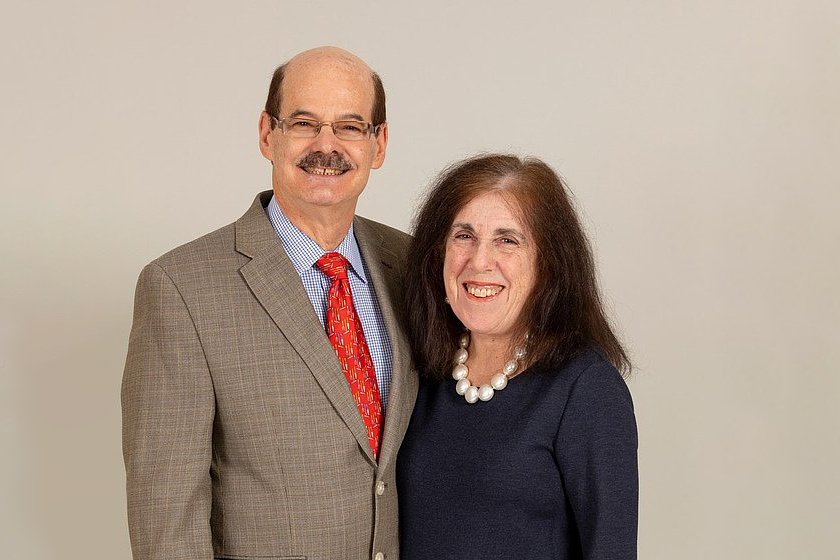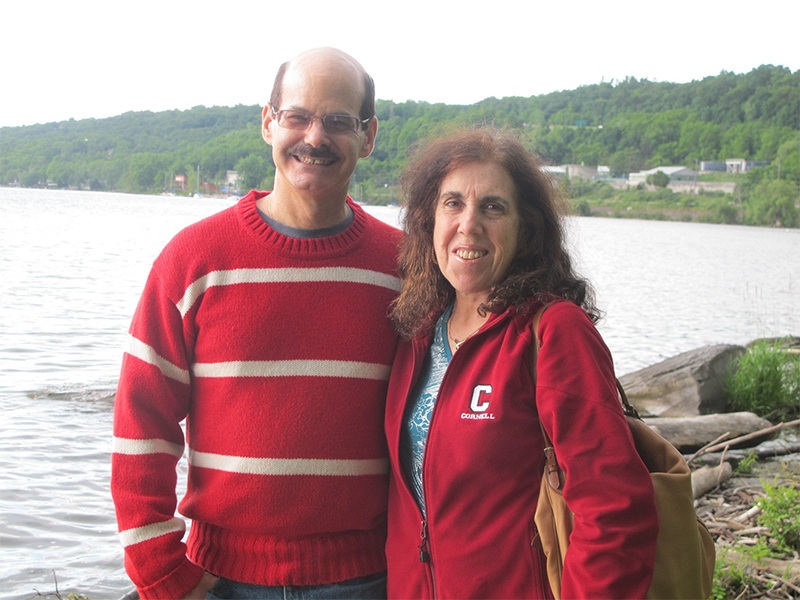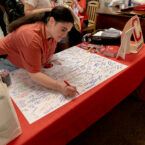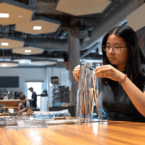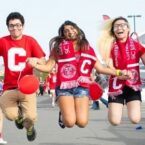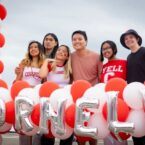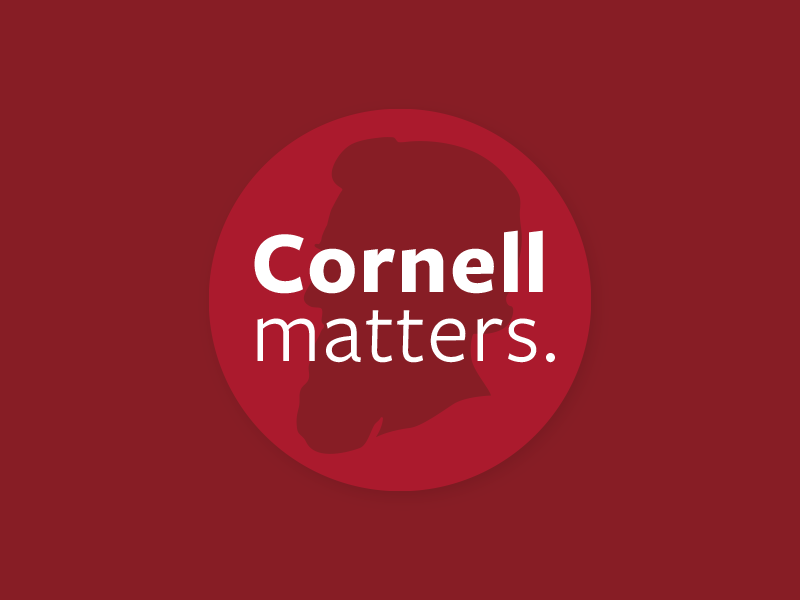Patricia J. Grant ’95 and Kamillah Knight ’13, MPA ’15, MBA ’22 sat down to speak with Kamillah about her volunteerism and Cornell experience.
Patricia Grant: I wonder if you could start by talking about your experiences at Cornell in terms of the fact that Cornell is such a big place. How did you develop community and find your corner of the university?
Kamillah Knight: Absolutely. So, you know, I’ve always been a person who loved to be involved in multiple things. So, when I got to Cornell, it was no different. It was part of the allure for me in attending Cornell: the fact that there were so many things you could get involved in no matter what you were into. As soon as I got there, I became a tour guide as a freshman. I was a lifeguard, and I played club lacrosse and club rugby. That’s how I started to build community and get involved in things. Then, I did a lot of volunteer work as well because I was a Cornell Tradition fellow. I also participated in things like Cornell Days, hosting students. Doing all those things really allowed me to create depth and breadth across the entire Cornell community, creating bonds and relationships not only with my peers and other students but also with different faculty, staff, and professors—just learning about the different facets that Cornell had to offer.
Then, that easily transferred when I became an alum. Even before that, becoming a grad student. (I went into a graduate studies program as soon as I finished undergraduate.) And again, I started becoming involved in different things but building on what I’d already done. I got involved in BGPS (Black Graduate and Professional Student Association) and joined the board. I also started working for the Office of Academic Diversity Initiatives, which again allowed me to get even deeper into connecting with different populations across the university. That was a catalyst for me as an alum to say clearly that I liked being involved in what’s going on and being connected to the university. Especially because I felt the university afforded me opportunities I would never have otherwise. It was important to me to sustain that involvement and maintain those connections.
Wow, you were involved in so much, so many communities! You’re starting to talk a little bit about what binds you to the university. If you had to characterize that, what is the tie that binds you to the university and had you not only get one degree but three?
Four now! The four degrees are part of what binds me to Cornell! I have two bachelor’s, one in economics and one in sociology. I have a master’s in public administration, and I recently graduated this year with my master’s in business administration. So, of course, being involved and knowing different folks from different programs is part of my tie to the university. But also—some people know this, but not everyone knows—I had my daughter, who is now ten when I was a junior at Cornell. And no, I didn’t take any time off. Obviously, this was a different journey than most Cornellians’, especially undergraduates, experience. It forced me, frankly speaking, to buckle down and really lean on certain aspects of the community in a different way than I would have, especially because my family didn’t live in Ithaca and I didn’t take any time off. So, I had to figure it out! That meant going and talking to different faculty and staff about what I could use to help me balance things. That meant I developed closer relationships so that I could manage my responsibilities better. And, frankly speaking, it created a sense of community around me, which I feel I owe everything back to because I don’t know how I would have gotten through that otherwise.
That is so impressive, and we all have things that we think about when we think about our own classes as a community of sorts, your initial Class of 2013. What was it like to be at Cornell and be a member of that community?
It was a great time. It was a time for me to truly learn about myself. Frankly speaking, it was the first time being on my own and honestly connecting to things like the environment. Cornell jumpstarted my love of the environment and getting involved in things related to sustainability. It was also a catalyst to the career path that I’m on now, which is diversity and inclusion, just because of the diversity that exists at Cornell and how Cornell leans into that and is continuing to lean into that. It was also a challenging time, being very frank and honest, because Cornell is Cornell. You go through your moments there, but it was still a growing and learning experience for me. That was a moment when Cornell was going through a big shift when it came to helping students maintain their mental health and doing what was right for them to, obviously, get the classes, but also to make sure that they were happy. I think this was a very pivotal moment because of that, for me as well, in making sure that I was doing what I needed to do, not only to pass my classes and graduate but also to be a good person in general.
That resonates with me. I’m curious, though: As you think about your multiple alumni journeys, what was a catalyst to be an alumni volunteer?
It was because of that community that formed around me when I got pregnant. Especially because that’s not a traditional path for an undergraduate student. I really felt that I was indebted to the community to make sure that no matter what the situation was that anybody was going through, I could help support them in any way, shape, or form, or offer myself and whatever my expertise and skills were. I’ve just always believed in the Cornell motto and mission: any person, any study. I really stand by that, and I think it’s an amazing thing that Cornell does and embraces. So, it’s important for me to stand by that in general.
Another reason or catalyst was the Cornell Black Alumni Association (CBAA). My first real alumni volunteer engagement started with CBAA. I was a registration chair for one of their reunions, and I’ll never forget it. It was my first real opportunity to engage with alum who were much older than me in that capacity and, two, to see how people came together and what a community really meant. Especially because I was relatively new to being an alum, and I hadn’t really engaged with older alum in that capacity. Nor had I been engaged in something that’s so big to Cornell when it comes to graduations or reunions and things like that—it wasn’t even my reunion year. So, seeing those things, hearing people’s stories, and realizing, wow, this is the impact you can have. This is what makes it all worth it when you do give back and help people feel connected to the university.
I have a similar experience to CBAA and getting involved more. When you think about being a class officer and what it means to serve the Cornell Association of Class Officers (CACO), what sort of memories or touchpoints come to mind?
When I went back for my five-year reunion and saw all the activities my class officers had created, I said to myself, ‘Wow, I want to be involved with this.’ I want to ensure that this is sustained, and we’re bringing the voices of people who look like me as well as others to the forefront, engaging them, and making sure that they still feel connected, not only to the university, but to other students. So, it was important to me to reach out and start to network with folks involved in CACO to learn more about it and understand what I could bring to the table and be involved. I realize I have a different perspective, especially now that I’ve graduated a few times! I bring the perspective of being an undergraduate parent, and I know there are a few other folks who also experienced it, and those voices don’t always get heard, so that was important to me.
You’ve had multiple volunteer roles. How would you characterize each of them? How do you think of them as similar or different?
I would say that in every single bond or connection that I have to the university at this point, the similarity is that it’s what drives me and motivates me and brings me pride, as a Cornellian. They’re different in that they allow me to stay connected to different parts of the community of Cornell—a diaspora if you will. It also allows me to be a kind of connector. Oftentimes because I’m involved in so many things and sitting in so many different meetings, I’m able to bring different information to different parties that might not otherwise be talking, which creates much more collaboration and brings a lot of different insights. So those are the similarities and differences for me.
That’s fantastic. It’s people who are hyper-involved and looking to enhance their own experience but also that of other Cornellians. How do you approach talking to other people who may not be as involved about becoming more involved?
Well, I start by telling them why I’m involved and where that involvement came from and then share the different ways I’m involved. As I’ve been on this journey, what’s also been a realization for me is that it’s important to explain to people the different levels of involvement. Everyone doesn’t have to be someone like me who wants to be on every board and show up to as many events as possible. It doesn’t have to be that way! It can be a culmination of things. You can be on one board; you can be a person who just likes to show up to support different events, or you can be someone who’s engaged in the capacity of donations. It’s really what best suits you. I think once people realize that there are so many different ways to be involved and then realize, because of your different connections or ties that you have as an individual to the university, you can create what that involvement looks like for you. I think once people understand that, it’s a catalyst for them to become involved.
That resonates with me. I think people think they have to fit into all the existing boxes, and there are so many ways to get engaged. Cornell is a vibrant community, much like its lived environment. People can get in and possibly create opportunities to give back in their own way. That’s great advice. What would that look like if you were to put a throughline from your undergraduate years to now, your alumni volunteer life and journey? You’re a Tradition Fellow, involved in so many things as an undergraduate and graduate student. There’s so much there. How do you summarize or characterize that initial part of your journey until now?
If I had to put it into words, Patty, I would characterize it as an evolution of Kamillah. What I mean by that is that as I’ve grown more confident in myself and what I can and cannot do, how I can show up, and what my expertise is, that has guided me in my involvement. So today, I work as a senior director of diversity and inclusion for a science technology company. My career has been rooted in D&I for quite some time now, and as a result of that, I don’t think I realized it when I first started this journey, but a lot of things I was doing very much had to do with diversity and inclusion. When I think of the volunteer things that I was doing even as a Cornell Tradition Fellow, when I think of the work I did in the Black Graduate Professional Student Association or the work that I did as someone who hosted students for Cornell Days, I was a catalyst, if you will, for diversity at Cornell. Even going forward, I started getting involved in things like CBAA, Mosaic, Cornell Council, or CACO, and part of that was, again, thinking about bringing that diverse voice to these different groups that often can be homogenous. It’s about bringing that perspective of connecting the dots and connecting people and helping them see what’s going on all over again with this perspective of diversity and inclusion at the forefront. So I think that’s been a part of my evolution, but you can see how that’s been a part of my general engagement with the university.
That’s awesome. My last question is: When you think about connections for now, who inspired and mentored you, who do you look up to?
That is a hard question! So many people have played what I believe is a key role in many different parts of my Cornell activism and volunteer journey. Some professors played key roles, and alum played key roles, but it starts with—and this is a funny one, but—David Skorton was one of the biggest role models I looked up to as an undergraduate. My most recent degree is the only one I have not signed by David Skorton. I admired how he engaged people and showed up for the Cornell community as president. If I think about the next phase and chapter, a couple of folks who worked in the Office of Academic Diversity Initiatives were also key in my inspirational journey. They were great people who—how do I say this?—not only did they inspire me to continue my journey, but they were also great supporters because of my individual and personal situation. In the next phase, I think about my engagement with things like CBAA. You have people like Michelle Brown-Grant ’88, like yourself, like John Rawlins ’06, who I’ve seen be involved and do so many things. I could go on for days—people I look at and follow, who I’m just like, wow, I can’t believe they’re doing this and how they’re doing it. People like Linda Gadsby ’88, people like Deborah Arrindell ’79, and just seeing how many different areas in the university they’re involved in and their voices, how they’re making sure they’re being heard and being people who represent what’s happening and what needs to happen and really pushing it forward. Like I said, that list can go on forever.
Yeah, those are some of my people, too, so I appreciate naming those folks. It’s true. I think people sometimes think that I must just be nostalgic or something when I talk about Cornell. Some of it is a bit of that, but being involved with two other universities regarding my degrees, I’ve never met more impressive people than I met at Cornell. It is just a special place and an environment that creates pure diamonds. It’s that precious!
It’s true. The product associated with Cornell is unmatched by anyone I’ve ever met who goes to any other university.
Alumni activities/positions:
- Cornell Black Alumni Association, VP of Programming (second term)
- Class Officer, 2013
- Cornell Alumni Admissions Ambassador Network Member
- Cornell Association of Class Officers, Director at Large
- Cornell Mosaic, Member at Large
- Cornell University Council
- Cornell Campaign Cabinet
- Cornell Black Alumni Association, Reunion Registration Chair (past)
Professional:
- Danaher Corporation Water Quality Platform, Senior Global Director of Diversity and Inclusion
Undergrad activities/ positions:
- Arts and Sciences Academic Integrity Hearing Board, Board member
- Cornell Pre-Law Organization, Treasurer
- Cornell Investment Club, Member
- Cornell Tradition Fellow
- Cornell Tradition Student Advisory Council, Board Member
- Cornell Annual Fund, Employee
- Tour guide
- Lifeguard
- Club Lacrosse
- Club Rugby

